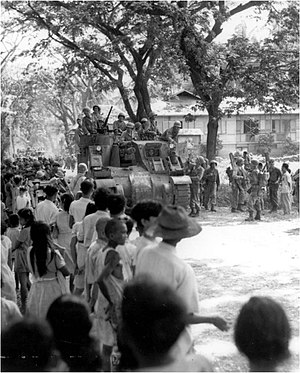Battle for Cebu City
| Battle for Cebu City | |||||||
|---|---|---|---|---|---|---|---|
| Part of World War II, Pacific theater | |||||||
 US troops riding on an M7 Priest enter Cebu City |
|||||||
|
|||||||
| Belligerents | |||||||
| Commanders and leaders | |||||||
|
|
|
||||||
| Strength | |||||||
| 14,900 U.S. troops 8,500 Cebuano guerrillas |
14,500 – 15,000 Japanese troops | ||||||
| Casualties and losses | |||||||
|
American troops 410 killed 1,700 wounded 8,000 sick |
Japanese troops 9,000 Killed Est. 2,000 committed suicide Est. 2,000 captured |
||||||
The Battle for Cebu City was a major engagement of World War II that occurred between March 26 and April 8, 1945, during the second Philippines Campaign. The battle resulted in an Allied victory over the occupying Japanese Army and the liberation of Cebu City.
After launching their campaign to recapture the Philippines at Leyte in October 1944, the Allies followed up that victory by dispatching troops to Luzon in January 1945. A month later, General Douglas MacArthur, overall commander of Allied forces in the Pacific, began planning to take the rest of the Philippines. General Robert L. Eichelberger's Eighth Army was then tasked with conducting a series of amphibious landings in the southern Philippines on islands between Mindanao and Luzon, including Cebu. Prior to the war, Cebu had been the Philippines second-most important industrial center, and it offered the Allies a harbor for future operations.
...
Wikipedia
